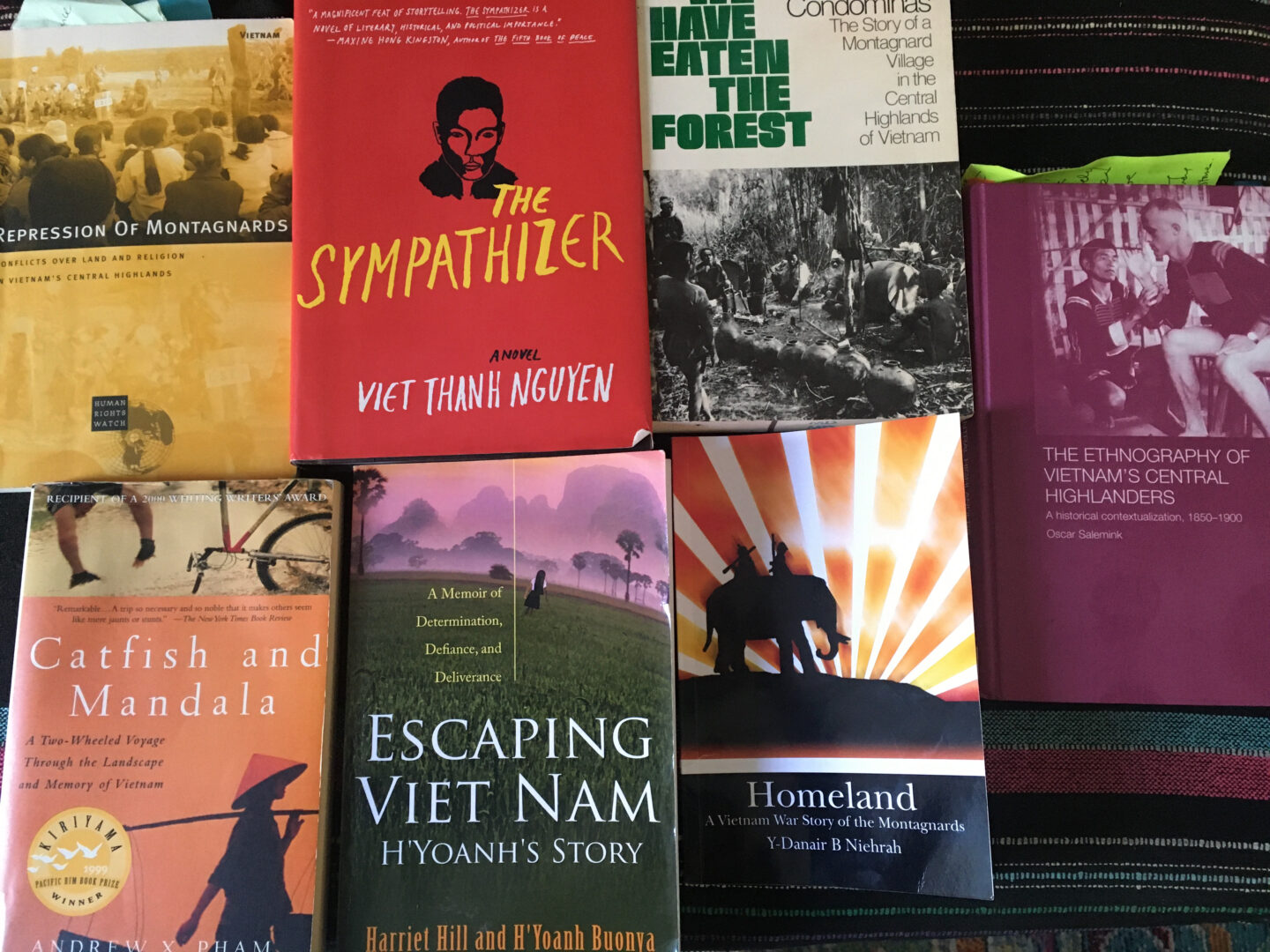What is often forgotten is that Vietnam is a diverse place, made of many groups of people. Vietnam has 53 ethnic groups, not including the majority, the Kinh. Needless to say, something is lost if we assume Kinh stories are the only Vietnamese stories. There are, of course, many commonalities (as one example, a war), but there are also specificities (such as the way that war was experienced). As part of diaCRITICS’s mission, we seek to highlight these voices as part of the Vietnamese and Southeast Asian story. Indeed without them, we would be missing the complete picture, to say nothing of the richness of our histories.
To that end, we are thrilled to welcome H’Rina DeTroy as a contributing editor to diaCRITICS. H’Rina DeTroy is an award-winning Montagnard American writer based in Brooklyn. In her prized essay, “The Vengeance of Elephants,” DeTroy writes about the difficult task of finding Montagnard representation, rendered as “unreadable supporting characters to the Americans.” With this in mind, this year DeTroy started the “Apocalypse Never” workshop for Montagnard American writers. She writes about the impetus of that workshop in this essay.
With H’Rina DeTroy joining as a contributing editor, we hope to not only highlight Montagnard and other ethnic minority voices, but to show that they are part of the very fabric of the Southeast Asian diasporic story.
On that note, don’t miss the April 16 episode of ACCENTEDiRL (a collaboration between the Diasporic Vietnamese Artists Network and the Smithsonian APA Center), which will be a conversation about ethnic minority narratives featuring H’Rina DeTroy along with Paul Bonnell, Mai Der Vang, and Souvankham Thammavongsa, hosted by Viet Thanh Nguyen
– Eric Nguyen, editor in chief
~

In 1958, as the Civil Rights Movement rose as a force to be reckoned with in America, on the other side of the globe, similar desires for political enfranchisement and self-determination stirred in the hearts of minority people in South Vietnam’s highlands. Ethnic Bahnar, Jarai, Rhade and Koho organizers began to articulate demands for claims to our ancestral land rights, restoration of tribal courts, and greater participation in the political life of South Vietnam. Known collectively as Degar, or commonly by the French term Montagnard, we met and negotiated with the GVN, South Vietnam’s government, in multiple delegations starting in 1965. Fearing cultural erasure with Diem’s demand for assimilation, we pushed for protections sacred to us such as right to teach our languages in regional schools, alongside Vietnamese.
This image of indigenous people organizing pan-ethnically and politically hardly corresponds with the better-known pop-culture depiction of Montagnards in Apocalypse Now. In Francis Coppola’s 1979 film, hailed as a masterpiece, Captain Willard and a patrol boat crew venture upriver into ethnic minority territory when a shower of arrows rains down. In black vests and loin clothes, Filipino actors playing the role of Montagnards crowd the river’s bank. A child-like horde, they’re loyal subjects to the renegade Colonel Kurtz, who leads them like a white demigod-king gone rogue.
A rebuttal to Coppola is part of the inspiration behind creating Apocalypse Never: Writing Our Origins Stories & Imaginative Futures as Montagnard Americans. I designed this writing workshop as a chance for participants to interrogate Orientalist tropes employed in work like Coppola’s, where the false binary of the “the civilized” versus “the primitive” casts us as the latter. The objective is to reclaim part of our history by engaging it creatively through stories, poems, or essays. By centering our experience, it also becomes a space to explore our diasporic indigenous, Montagnard and Dega identities.
Coppola aside, a greater inspiration is the vibrant refugee community in North Carolina — home to the largest community of Montagnards outside of Southeast Asia. Apocalypse Never is part of a larger project called The Past is Present: New Montagnard Artists, supported by the Montagnard Dega Association, a local community organization with funding from Creative Greensboro, made possible also by the office of arts and culture of the City of Greensboro. The Past is Present project features two emerging visual artists, Ysuu Bujiang and Sachi Dely, who will create new and exciting original works. The Apocalypse Never workshop furthers the organization’s mission to support the community through art and the chance to imagine new narratives.
This writing workshop is also an opportunity to break barriers, centering for the first time the Montagnard American experience. At the New School, I took a course on the literature of the Vietnam War; every author we read, besides one Vietnamese poet, was American. As a writer, a challenge I face is that no body of Montagnard or Montagnard American literature exists, penned by our own hands, that I can refer to for inspiration, guidance, history, or a sense of identity. Nineteenth-century French colonial missionaries reported that the Degar Montagnards were preliterate, having never developed a writing system of their own. Once some of us gained literacy in the twentieth century, the books and documents written in our dialect were destroyed by the Diem administration, according to the Summary of Montagnard History written by Montagnard leader Rong Nay. If history is made durable by the survival of the written records, as Montagnard Americans in the twenty-first century, a radical act against our historical erasure is to write our stories now. By defining our own narratives, we become the actors upon the imagination and agents of our futures.
To Coppola’s portrayal of the Vietnam-American War, which denies our complexity in favor of one-dimensional tropes, to Apocalypse Now, I say apocalypse never. Never I say to the idea that someone or something else will define who we are as indigenous people in Vietnam or the diaspora. Never to the notion that we serve someone else’s symbolism or cause while erasing our community’s manifold identities, brilliance, and struggles — the multitudes within us.
WORKS CITED:
Hickey, Gerald C. “The Highland People of South Vietnam: Social and Economic Development.” Prepared for Advanced Research Projects Agency, Rand Corporation. Santa Monica, 1967.
http://www.degarfoundation.org/bajaraka.html
Contributor Bio
 H’Rina DeTroy is a Brooklyn-based Montagnard American writer. She was the recipient of the Cafe Royal Cultural Foundations Winter 2020 Grant in Literature, and the 2019 Emerging Writer Fellowship at Aspen Word in Memoir. Roxane Gay selected her essay entitled The Vengeance of Elephants for the 2017 Curt Johnson Prose in Creative Nonfiction by the literary journal, December Magazine. An adjunct instructor in New York City, she also offers private workshops. In the spirit of Apocalypse Never, she created Multi-Verses: Writing Our Immigrant Origin Stories, a workshop beginning in April. She has a Patreon and appreciates any and all support to help her continue creating limitless spaces for Montagnard stories and imagination!
H’Rina DeTroy is a Brooklyn-based Montagnard American writer. She was the recipient of the Cafe Royal Cultural Foundations Winter 2020 Grant in Literature, and the 2019 Emerging Writer Fellowship at Aspen Word in Memoir. Roxane Gay selected her essay entitled The Vengeance of Elephants for the 2017 Curt Johnson Prose in Creative Nonfiction by the literary journal, December Magazine. An adjunct instructor in New York City, she also offers private workshops. In the spirit of Apocalypse Never, she created Multi-Verses: Writing Our Immigrant Origin Stories, a workshop beginning in April. She has a Patreon and appreciates any and all support to help her continue creating limitless spaces for Montagnard stories and imagination!


